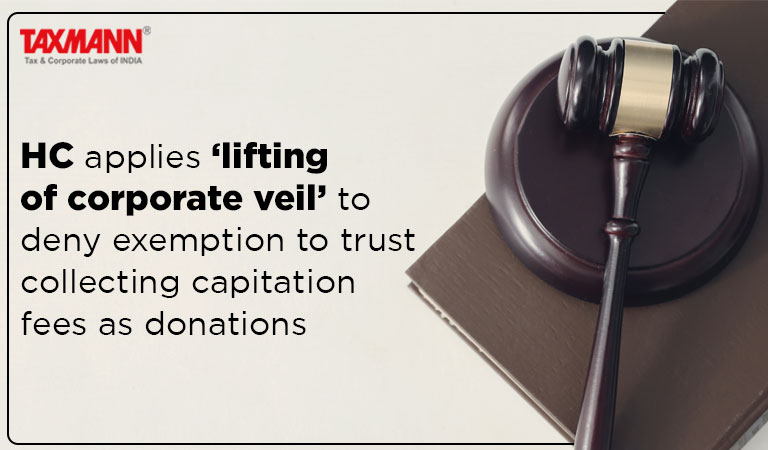HC applies ‘lifting of corporate veil’ to deny exemption to trust collecting capitation fees as donations
- Blog|News|Income Tax|
- 2 Min Read
- By Taxmann
- |
- Last Updated on 4 November, 2022

Case Details: CIT v. MAC Public Charitable Trust - [2022] 144 taxmann.com 54 (Madras)
Judiciary and Counsel Details
-
- R. Mahadevan & Mohammed Shaffiq, JJ.
- J. Narayanaswamy, Sr. Standing Counsel for the Appellant.
- Haja Nazirudeen, Sr. Adv., Hari Babu & S. Sithirai Anandam for the Respondent.
Facts of the Case
The assessee was registered as Charitable Trust under Section 12A. It filed a return of income declaring nil income. During scrutiny, Assessing Officer (AO) found that the assessee received corpus donations from a few charitable trusts.
On further inquiry, it was revealed that charitable trusts, from which the assessee received donations, got said amount in place of procuring seats in a college that was a unit of the assessee.
AO held that the assessee utilized said a few trusts as a tool for the transfer of capitation fees received from students. Assessee forced parents to pay a capitation fee in the name of their relatives or friend in the interest of admitting their children to said college.
AO held that the assessee had purposefully and intentionally channelized the capitation fee in the name of donations back to themselves, thereby exempting the receipt of the amount at both ends.
Accordingly, he disallowed the section 11 exemption to the assessee. However, the lower authorities reversed the order of AO. The matter reached Madras High Court.
High Court Held
The Madras High Court held there is no bar to applying the doctrine of the lifting of the corporate veil in the case of trusts if the existence of the systemized mechanism was found which allows the trust to collect the capitation fee as a donation through other entities.
Education can never be a commercial activity or a trade or business. Those in the field of education will have to constantly and consistently abide by this guiding principle. However, the undeniable reality is the collection of capitation fees as a condition precedent for admission into educational institutions.
The practice of receiving the capitation fee as a condition precedent for admitting a student is opposed to the provisions of the Tamil Nadu Educational Institutions (Prohibition of Collection of Capitation Fee) Act, 1992.
On lifting the veil, it is clear as daylight that the modus operandi adopted by the assessee and other trusts are with twin objectives. Violating the provisions of the Capitation Fee Act of Tamil Nadu as well as evading tax while seeking tax exemption under the corporate veil of being different and distinct entities receiving funds from each other for purely charitable purposes.
Accordingly, the order of lower authorities was set-aside and section 11 exemption to the assessee was to be disallowed.
Disclaimer: The content/information published on the website is only for general information of the user and shall not be construed as legal advice. While the Taxmann has exercised reasonable efforts to ensure the veracity of information/content published, Taxmann shall be under no liability in any manner whatsoever for incorrect information, if any.

Taxmann Publications has a dedicated in-house Research & Editorial Team. This team consists of a team of Chartered Accountants, Company Secretaries, and Lawyers. This team works under the guidance and supervision of editor-in-chief Mr Rakesh Bhargava.
The Research and Editorial Team is responsible for developing reliable and accurate content for the readers. The team follows the six-sigma approach to achieve the benchmark of zero error in its publications and research platforms. The team ensures that the following publication guidelines are thoroughly followed while developing the content:
- The statutory material is obtained only from the authorized and reliable sources
- All the latest developments in the judicial and legislative fields are covered
- Prepare the analytical write-ups on current, controversial, and important issues to help the readers to understand the concept and its implications
- Every content published by Taxmann is complete, accurate and lucid
- All evidence-based statements are supported with proper reference to Section, Circular No., Notification No. or citations
- The golden rules of grammar, style and consistency are thoroughly followed
- Font and size that’s easy to read and remain consistent across all imprint and digital publications are applied



 CA | CS | CMA
CA | CS | CMA
